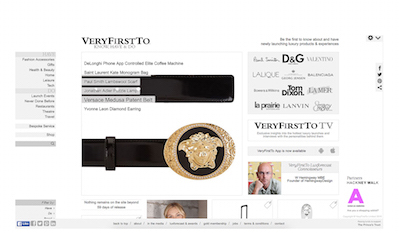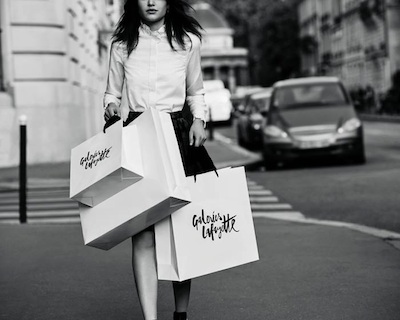Ecommerce platform VeryFirstTo is partnering with Action For Addiction to combat shopping addiction.
VeryFirstTo now hosts the Action on Addiction logo on its homepage, which redirects to a page educating and helping to diagnose potential shopping addictions. Retailers have struggled with revenue in recent quarters, but the initiative still encourages brands to land on the right side of the fight between business and ethics.
"Retailers invariably exist to generate revenues and earn profit,"said Marcel Knobil, founder of VeryFirstTo. "However, we believe that this endeavor can certainly be conducted in responsible and ethical fashion. This includes respecting customers, employees and suppliers; providing quality at fair prices; and providing helpful information.
"Whilst it would be extremely difficult for a single retailer to take sole responsibility for ensuring that consumers don’t overspend, retailers collectively can really make a significant difference," he said. "Through raising awareness of the issue, encouraging customers to establish whether they (or those close to them) might suffer from shopping addiction, and providing a link to those who can help them, retailers can make an extremely positive impact in this very negative area."
Controlling compulsions
VeryFirstTo has more than 184,000 subscribers and 67,000 daily visitors. Its homepage spotlights products from a variety of retailers, redirecting interested buyers to the first-party Web sites.
The retailer notes that a 2013 study from the Hannover Medical School published in The American Journal of Addictions estimated that between 6 and 7 percent of adults display some degree of shopping addiction, with the number on the rise in the United States and Europe.

VeryFirstTo with Action For Addiction logo
Action on Addiction has warned that shopping functions for many as drugs or gambling do for others. An addict attempts to change his or her mood through a behavior that contributes to a “high,” with medical experts equating the highs of shopping addicts and drug addicts.
To help fight the problem, an Action on Addiction logo on the homepage is accompanied with the question “Are you a shopping addict?” Users who click will be taken to a page on the site offering information related to the seven different kinds of shopping addictions, its causes, the symptoms and short- and long-term effects, the signs to friends and family as well as a self-assessment quiz and information on attaining help.
VeryFirstTo is hoping to get other retailers on board, but notes that brands have no obligation to help consumers curb shopping addictions.

Image courtesy of Galeries Lafayette
“Whilst there is no obligation for retailers to alert customers of the issues surrounding shopping addiction, we are convinced that it is the correct thing to do,” Mr. Knobil said. “We are not aware of any previous initiative of this nature and implore others to join us.
“With our site informing the world of the best newly released luxury products and experiences, and enabling one to purchase them, we are aware that we are promoting and encouraging shopping,” he said. “This does not mean though, that we and others, can’t behave in a responsible manner.”
The campaign begins at a difficult time, when many retailers have seen decreasing stock prices and poor earnings lead to pressure to make changes and spur sales (see story).
Moreover, the increased brand presence on social media and especially the rapid advancement of technology, which has led to programs such as Like2Buy on Instagram, serve to encourage impulse buys from consumers. Asking consumers to check themselves before compulsive shopping negates the cause of a portion of ecommerce growth, a dicey proposition given the current revenue outlook.

Image courtesy of Bloomingdale's
"It’s rarely a good time for a company, or an individual for that matter, to take action over for a difficult issue," Mr. Knobil said. "But that doesn’t mean it shouldn’t be done. It’s true that many retailers are facing a pretty tough time at the moment - but so are a good number of their customers, so this initiative is timely.
"We have heard negative comments about what we are doing, along the lines of: 'We’re here to promote sales, not undermine them,'" he said. "There are others who recognize that not only is raising awareness of shopping addiction the right thing to do, it needn’t undermine sales.
"There’s a strong argument that if one’s customers see one as a friend, rather than a fiend relentlessly trying to push them into buying things, customers will trust one much more. A trusting relationship between retailer and customer should result in a long-term flourishing relationship."
Catalyzing impulse purchases has not seen any widespread public relations issues for retailers, suggesting that consumers, at least right now, do not see the problem as unethical. However, if this were to change, those that have previously taken steps to educate consumers on the signs and dangers of shopping addiction and helped to curb it, even at the expense of a few sales, could see commendable longer-term benefits.
Convenience vs. compulsion
Corporate social responsibility may be about relationship building rather than transactions, but that makes it more important for brands, not less, according to Christie’s executive at Luxury Interactive Europe 2015 Oct. 27.
The speaker offered a number of tips for brands looking to improve or get started on CSR, offering a number of Christie’s stories as support. In addition to quality craftsmanship and great service, being a luxury brand means using a highly visible and admired position to fulfill moral and ethical responsibilities (see story).
While VeryFirstTo is attempting to help fight shopping addiction, other retailers see innovations that might encourage impulse buying as offering unprecedented convenience and access to its products.
For example, department store chain Nordstrom is ensuring consumers have no problems shopping the look at the 70th Tony Awards.
In addition to styling the nominees and presenters, Nordstrom will make accessories available online as the performers are seen wearing them. Instantly gratifying viewers will likely cause a spike in sales as consumers seek to emulate their favorite stars (see story).
"We believe that the campaign showcases trust, authority and care," Mr. Knobil said. "Any retailer who wishes to turn-up the volume of these values within their own brand image would do so through supporting the campaign.
"Just like you would be far more generous and supportive to a friend who you know has your interests at heart, many customers will be more loyal to retailers who they believe actually care."
{"ct":"sTyWpFBPZLVssfQSLIb3pvtNW82sY\/DiGUvgtEGwxuGf8MpkRv4pAruKtUrnWAF566cbS28kSPysit42NgF1709GGMIUNmygqK92xuCDr1C4F5hfss45ukRsJhnofpXG\/1EagTQELEOLAYc8kD1XMtYKS6q0OS6+pJbEDURwxvmLYsXYqJj6Rh6\/ufXbYL1nyv7GARy6SK\/iJzCuzIrTyt0\/5q+XCzJmSujKlBVpDKo7upx7PLxOrKWAXV1W\/8wj5ngb3f1MDuIS2toXgSaGN7YOpQgEl2n1I6i+2o\/KcLrSgvDtDtr86L8kR0DHDMZdAH\/pSxAcrEw7EGwW2eL289SKcSiz290KrbYTAhG9QUcBNzbuUvLKWwqagrTIEhDH0iVAW04d5z8FnvhZp4AhjeJIstD7nCv2QxhtxLcSpqFoKCav2zLyy5AT8U1NzhvVHBMWqEOBNIYcIIYc+NFVLQl+v12ihP59boQ2\/goCYb5QKdLHZ2ev51wbmqs9HPXtRl7AtREBklIDiyHoS5ggzpT+\/N4Kwq3bhb9hU+9\/jShgSvYAfTN8HvzbQ58GCKWISa1jgDSTuGzYkYsVh2OMwLrFjIzVAMmPwfqakdn8CdpBWxbXqKZXVK4oyjjKkTQGwoQpm1w1dMKDmTPt\/g7pvk\/9O+f2PF7XgfIOzvShPxK2XNMCY9XFKP8NLA\/bvguh0\/Pqg8zkgjbMEmdcHZugEWUxWSAJjMG02hAwHGYL\/SiumsniFNsFEHdUIpmHTaXsyyAO1RCnRoQZfs5x4LeWOOQfxXq419Y9MVyB0bQe4kXI5epc4x6Dhh9IbBEnICktPvknXQs3NMbWYi63LDX5D\/35D0jfpkNvOe2pxeAcxq84rQKUOT\/WqwPWd\/JhLmv8i3Msu3lXGHcCG0whHrbkfeL5LTgpoCPJxE\/Fq+l221QhkXQEnVpjz9kqY+XsBytHaDUfwREyzbFkjUnZERanN3n\/keNwOGjWP9+ECN0fcNzUJuPI3B\/PioqCNROKZIRMfVcQuuzCK9L2fd8dcwM2D+oF4XzBmiRzpJZf2qCtLpXl8OhHQRHAIOFvIZIm6SNsa+HxgrkpOlvL\/E7D1FyTlzwUCuKJ3pMO1r+2gW9V+rUdb3IqBSUj\/fgm4\/EQ7giPCWSQS9PF7LAuoYc9BBW0yy2Md11+Z7Qu3eU\/L98ulFXWe12Zs1q7VLwvmJsRhiy+skEuaz94jU1pfO\/lYHHvwuIKLINWwfwO45msdWfoDpFmkWEQan\/vySRY8OTTOJM0EvfdAErb0EtJ\/D2Mb6h0ejEIdsG0LaDOXQTxMxXNZyqMToMz8mPaKLcJBuWFOeIbfLjOZ1vokPecsa3GbA4kFRZiaQjFJ1houKRvKAgXGzp0u1m3Q+I4BlhKW76bVC\/VUL1VG7EGqEf9zQqcj0tb5ofEZUnuKgNSGNoBw3mT8RBQe+tyaJl9dqkvmAMnB2DSQ2YqKn4ZFWpuCWF2GhUFe1vE53nHCVIt8NxJN0Q1WISqRDiGSaNtIMj4Id6INVu1qioqE3\/Emj6cOHszefnrMTuvtB2SYS8hcriEWwnD6CP8kGxRytZovlAgKSqfQek8V5tXnYT3pZy6s2JQKfxjLrj0zWxGRtS3Ukp2N9+4Sz9L\/0TLcKPWBGXO4q8DcHJDf7jbDjdOdRNWioj0zUdhaSIW+5ZRSGlT83XcKzmqNOnIAShv7hGsDcgQyL5LBFdJdcV7nSqPL+UDRIlN0yQZ7RmageV3csCU5CzfnfyUm7Sa5rj6f0kEgUc1FUtwMO7rTVwkfw5OAFBxb2U\/S63hpXsRAjmaGpNwseANfM8YYKsS0L0IH+xw\/z2lRgRnzfUcrfhqWhrYtwVEZBmXQ6ZCm36X8J4irPN7+4IP\/vRJbepR0LGaWljmwXhyVoFn3DNC82BeIOUnrYqr9uMOS45n555262jwINKDDcbO3auZ44nOiqCN+8LDHfFPp5lVL76P0RfvDphYu4ZbLe+9\/Yr\/6VVD5U5XjMGdr92ienK9ucZ2Zj8ilEg9C1iQFt1Q0TVWHjhw\/jrz0n2behfDGBrckJ1lm0q2SBvwzECWeY6qzBiU6OEBgEgd28w6FNqlojeG4qbIMcU+5nnOcpfZqB5AXgSLCYwbQsdyr7YcPYBEyQf1hf+o5djrb9ptESSBGXl32XwwGMrmpyQNQP9ScZM0hO8fOB553l5sKZ2k0OheZXBS\/tyrscnD+JXrXhYVAQqiaO7pPXqcF5JpW5+wTKK36kKVW2o7022CEkkzeW1a8c8GMkF50wzJnIFbseCPfVo\/3+5iKoUP4LQ37tamV7bJJcbrgGZsFfcA8pYdjihj2N5sLxt3Nz3Pipm66+UxN63uVFDVQll8WgU3Mhij3EYnqS07moJ5eBR3zTPo+OqG8AA9u9zu9DQ3DDBi4tdjaQS8Vt0IKoAvVqQZSH2iQ22ay6POYE8\/Nv2aXS4EUIdu4m+qCKr0y+QuzhkFdl+WY3tuWxWViOKkKuT6ihOkaj1\/puS8f1G8NjJs\/u3CGFNcqiyRlNJ9yE3Z1cEIx3bw+JNzLAowHtBQ1OOUiwYQJo62l6YDl3J66X27ijOnR0frfA5CxZwfO4siWi0FnQr\/tWSgMaBWNPck6MO\/ww5Olyq7eoJ3h4VhNOTfc9cLn42ziNhsXBJi81VFzoOfSeACyBDUHh7a483LyRwNbJmkbvVDCE4QxFqgtleyDVKPnHX8SlOPgDNOguGRe1MSMpBnCRf5GADIVngeJ3R4fPczHj3DRLaXfwu\/tPyMc0y3q5CS7ByjPl4eYnxWmSmMBZXJPwjTRYVMLieGv96x6nHWN9yVAgD+7f9d3FO2S2gtsS1nMm9eUjctxpE1Zt9OQ9Pfyzl6jCbLB5TFtjHP1dudHM6tdxI7UotuzQ7q2XW9nnNAgQSnUFxujwL3L1kS5JYb9uQfUOluSElXCGUVdGk\/cyVl+PlRzwO1kfb1XdviUJ\/dvL3++6GJElrt15vN45qfSwP3MvTMq+KMywWcNYU83h4gtbS7\/+rlsrdLNeA8PHV1LDiBRzmBlKA4+GTt+xvbWgU8yNGiOVkCQm35ofq6vjSRICKoLazykF7\/LXCQ6KafZO\/ApNnnyvgeScWU1wq6SE1M9QYTorwJbb7fXDQGp\/bmc611v3gdznai65NFgM0jpgsGj9mjF9kVcWnkKkw+CBeexEQl89B3\/SDHZsI+xwY0LmcYRlTeUDlBbknc6uel8liSvpEu1\/IorQ6BWFmOklawEg0bUmbU5RQ8AYvnuigEQUWBLv2nhfUU9VDNLU8j3enYDLivMUvbkDPkQU4bLGmKCxjx1dKENwZqfiF2tWUSjd9A78UxEA8pHg1PVUpI7ebQK4xa63aOJuDxzhPm5HeB2iFEqasziEgZNnAIkHpgzBwJl\/szvj7z6tPbs32KZq5KHc30V0OxKKAIXq5Aw4dKyMOZIFR2zFUYsNMJvl+3SLqs\/ysT6kJ0YiDdUgj22DvZ2Zo5+CWhhvjEWS5ui7fLRRH+l8SHVMzmJJygLy9Fn3uXF9T7OwIgopOI1hI12pfo93ye0Y0raapk0eML1xwggFaICb3frAIhu70Z3k512tNt86+J2PapMHHJp5sYsqUAPL7+F\/OlRfwk1iLshsr0F3imo7lL1z+C0h2qwTTcszVpZu4wwnJWVvpMTEeCys4FRmouo+dqd7u1kRe2iDsmgjWcihpuSc+jpl2HaIv4dG1acfGRR2qYHNa7kg7hqZhVzFhPl6qIcCbOqK3liWkEI8sZACqd5YVcRfsn2vrV7tr7hpSQL0zvUyaib8ranzpNS4zqfB\/IxAfRtzKYDQH7zZYXHfHBJtCnXGyN\/sO0m5fkxuBQEv9279BJOJWkEdPq5Ffe3WIlpTahWfRadXAfMyZFIYD5T0x6n\/CCOy+TUuv7e5KVPnuRM56ERaUwFnvJ9MIHhpVoUnAiDBuI4uHi\/sYq9ibBtMw9pDsw+WI2NWgvyiZO+ukNCL6f9H39PGaZdo6zOdodsB3dEQRgo6Yv\/XAC\/DBGlBwcjyLRlUTxNOs4rQzJpajMtQerI8G1ZPGiRO\/4r1osMHti6A02uJKSyxtePCva3QCo8Se+8bg+M9WdL4EExcm+zOuH6wOfqbRxckUmuEcPjPRZkhorTM4NmMh7hVY5jhKzboLPED2asp5VRGqmO22jS1uBoadkgIgg+GwXuoGQwNbIU9L4nEmPZMQuDjm\/OJLSU0OyDzeu\/zXZG94tvilnFW9Z4vH+0q8Dy+YWXOX93HCdsXyZTFhYERK5+oIMvxdVSIwkBQh9c9LTrCWqDamEpu39I\/F2Um8J\/FBE+28RuCrLgHmxdiopXowkMfBplNg9TTDPg+b\/MnouYi0jE+4DUPVZtSCFV81NSXnr4UnCK12wgU4l3iy6w5y0h+X0+c0FQRgT3F5RD9ozcsbaMjMq0cJf07FL9vLd2Unwje4zmQW2K7ExlHRzvUGYob9vdpkmK52h1ICckIGFNV9ZkO\/6OnPzEpek6w4LKkZ7L58GIO0nJYF6mH7VA9flMpKwNi2dbmapoKBIywt0sRDmXrWolnza1larWAZv9EF9DA2l2PKUfrm9vYuxw9Qbv4ebHRJbvJxliGnhlAGEFpxIaKsj2xA95kZmqwJsJdZ8+21f7lPyF3xYsr9uvoOQHW72ZDFydCvwld6Az8Ql0vb3\/3MzvarqsX6QoyLk+jvpQmaZUztwjgbg1bVpY\/0pmncS8S5vWiOJdhNpKLDFdHWSb\/kDaQ6r3IHHmiBhEXObp49+rxS3Tym1q3lmJGSW2vL3X25aaZkLYqwty51B8iI3u2\/orevyf1Z4p2LvJKI1wtfr0EhKkceuDB0rpPEBaodlvip0tdEXYTacCwXb\/kgwbUVuACOFT7Cw4rwJkBIPX1g7nTie55M65f\/gtd\/qXrrrPTmOduZbAKzlYeHwF6y30KcKa7RHLmi6vYe2EYyN1bUs\/bzwqoFJRc4fV7fST4kv0mJc9AriXL8BAG19h4wQM5Xk6zDbIdA7DlKmoUmf8FYY8wkaP6sDndN2wnLHj0jTjjk2WKtroXKQ12wCL0jY4zpHHdmwqOWIhFvE28wGFe+V00f4kRcf8Ps8StNuNZz3+0y2d\/+ckVDp1RGaUFu++AzyeJK66oe3j6i3\/CGZnFSj5\/rH2cQFkN5HSOpHzWBpR0tJGzi691RIBOg2WFB37kysqHzRUBi2eetzigZOeWTSWpKzPZ9yF\/foMzeWIgwkMdHJLUln2p013KlHeD9oetfqStvvBj\/G9yyMd5uNkzasnylRuXt5UknEjqxceHhp\/uABupCDHtuo5\/vuesCfYQR5QsRwlfzhfcIjLNbTdKajHzv9oWZyG9\/w2iKWIsCCFaSEaZUxKlMItH2AtupKDPB225EsyWlJx1cgNvw3fbW2mMUbLlkWN9XYQBf1tU+NqCAFYoAyhTztm7gPOD0OzNdc70WT55Houuoruk7TyxL64vRPOphTfq91SrdaAiVDDD\/GWQ9ZRu1CrizqoSlXGgsv+sUP4tIK21sid5AmT7SeEYXvYbWd5lbD6dQyLkejwBAu2tmHBzRhS032L43N+T4VSv8sT8Ux\/L\/gI0XIFcwAU9oNW9aLi\/8aOh5xPEY87KCNipGo76acDt9gTKxf6MEMyOzhoPjCIyPZe\/nvtma3Vs9SyOi3+8iirRuypfn\/rJblRgUHY51kd1jSbRrRxbmUQWzMT0smPLYntdz\/VdZaLNBCJerINPiZ1aTDpXJ+J0XxL95uQw9C3wHUde\/FFBYrqsg7QdVW1FE1FWwtYjL2nRMq6KDfkrCZGV7VbY2xtIjjhvsWwbvYI7NaDqOgRYcb32lsLN+KAA\/LosuHNODLYoWkkXh08bFmLdVh7KjkJKL4gcTJtnXgii0bsQCx0KB6K8rnDQjNCNi+1m02HIQsD52U4Z8sv9gFy+NBt6S\/rNkiQwkE7lHbjU8FPmTozfXHcuxfm\/8fPCc41wwpyY\/hvam9MyNd\/S\/2b9TXvoZbo9vX4j0bCPYJRqOOrFrRJsL1gar0h4UksJzveGzXF5vgCNLHXTT0Pcd55S\/Wd9W+GSJZN0IfxoiQXl85lsb\/VWSb4LcQT0xWo45vFdA0ay6EUryENlyUUrzc4\/PfCG1Vjar80Z4J5twWNLZ9Ivk3Y5XSl4Tosvp8GcLrk\/j\/gtrkmtis0xX5PBdvSdn\/MBqj2lugNbeFoFjbD02JpVd5Z21SULxnZm1pXwhtajzLCDWRR8Asrmf6b4JgII+LzJjqsK32EjUvlhGlm33IWMp\/enAT39\/q9k7KCpNvrgvX3MxoWRGFDzliIz8MIeONiGtRcEW1ivLCuU8p1s2PCMONOtAORFr+isIQMJ15SAc+xJ7TWIGqduNKiQBoxnryDF0Pgf0IVtf+X3PN4U0Ytmp8HB51PDXoL3cm+AMsmYb5JD2PWQ5adTim5JvfZX1ysSv9edIIPRT\/5ZKaVmnltzRhyjLZEMnLPPTUl7h85psI8qK5V1oD1b7QjMYaZtxIrRpN9htoLkK9ekzktTUzwZb1N38lgdZYb\/BmIb5Uxz9DgkvXzSjZ35JiA7akQEm1pAmkguQI5yG8CFgYdez3r9tvwzTJQSQ38AoHcdB5L7p6Ph0aMVBM+yUg\/xZTc\/iXLgEzxIqPuTk+7jpctWvPSQNjYYtr0fhPZP9QduqcEq93kMBuEIFwXWHcyIvnaIjuCWC\/CmbFzNjbMAaGnH7IF+C\/ghzyBEtpaIsPxbs7Wfbxi9QSMdfXeFcSIbPeD53KdSCdStWveZIqmw2jYEtDSKDIr801MVblFq5iNebBoN5zmXHyIw+vltVqbkwEQ9jPKFRm8C0EMABEQvxgetSZFQKEkq0pV2t1ZjQ8JgWLIvK47+LuYUmHLshMOxDCxMcrGVmjXumhL3Jm4qt3wGw12Hfnf2Hp3u0WqktT+IJNchd\/otzmz9Ju0gFKeMAgULRuE3dc\/duU3UwgPpoZQUGAreVHt2fifihTvCjOIvq2Rnc0sUTIKo5m3ezVjAlmbx2iDXVGatZ+4Vv6XNhSNtzX5Xueir1Tm1GX2uHtLrE93n+gXedBtVAOjxkCbQ9md5QnBSqYsfoyz1mbLmBgDX9kkd0tMZmoUvbDEDFck9W1eseflMN41QuCahB7XTu\/7iw3DRNWYftVXoFmOw46WB8Muk2AsrgN3MaiovQu+g7JUWDkR2nLVlKEHsc9dRF6PmfIBy5AjbkpQ2tIOVpPDq3aLaLbjrfBu+VGdDgc7gGe3XXZyT07L70CCcJw7JTMauhwI54l9aVx5vBOgspDHKiPfsTiPUoCUcAkzZlzXq8f1LKF6qQzUOwZ+0geGLQh2CZGl4Q0mA8eAJ5SiDN4fo\/zPXv6ZwmY2KXheq\/8mDVAdW0K3RhYkoLiDCeqsRFJaFVM+9F2fXLBm4jLJIGgWFJhk28fi3RDAA6\/ERTFrL\/tpZ\/iqmkkt4WghyBswAKSIYrNbvv8PLjwbxs\/P0g+0euJW+wRk2Lnai8Q4numMPpEfLkqTbpSMYxhv65kYCY4Hftblv3s3g+xd6aa6WOYEykUSVsivjidmqC3sJ\/IYItoCAlKkYfSccyn2pu30ags9hJSEnv5HcUJ0LBwSrbj\/WRmWCK0E\/xfqXGW2AkeTqcolroDO\/GqluNpiqkO1l+djniEio2gMNUBl\/lBcPJwK3nEVjBVnRxcdekyMjyl0Vnsb4ln8VayFgSLLLNBAkfKARRIY+QgMppGLrzw5nS+tDd\/vY3Mfh59XM6gA6X8JU22GRECC7l3Ylg6uMJ35IcOFPpfxJ0G1SYZQ7fTRjwMfUU3uDdxZdGp5HjMwU9mfLYewKLVCMBdJCuSulOuA5V9BBUaGlc6nsnSqqHOOn5WFP8OSVzQ3O4tCUix0iAf7Bc7ey2RVZOc25+41i7SKFWRN0\/xLQxvc3jfVmlkWOIOAoOteIzN5MRBfblVkj36Y641k6XBV01XIrfylJyBDmxuM+hpmkI1NETlwpceM1TBgAE57s5gaRtF9QyDE2CwEdvea7SpmfP6Vb+cfB\/qXS5iKcFcjc5JsoKk+zZfjnwb3T+RmNcf4EyQWIsUvKNI0GjIBDf5+8m0zVtF1YuiVMDcPlhGssEfK2YImxYrItxJb\/3bo64Uge88HpHTaRFKfdu2Te5ZFLNY57vVajPm2dw0BKjGgeFGsohLNlxp+iIVuXovAy2bS4Wha4i\/v2+\/4PZMz5EImPdnUqr3vJfCuDjzIc3+dqyPYQrp+WAuU5D43jGMZe\/ATTBweEHohiY6PIlVCmOsCK\/mxMjKpLH0OT3Q45rlflHO5I6HygZov6ov622zcVlXh\/XZEy+mjmYrkiuLDc5dLW01d6JpHtlkNl9tZ4g0bEcce78X7oZgxNXTR6glCaDZCAACIs4JPc6mwJtpE513PcRGBFwF4IomBQMH+FtRF9sp1ene4KeaJzt1Pw3r15YrgrGoNlWXH3g9uBtQX\/g1400i0o+hPsOHsistbum+oUyb3Vdec8BalgU4qPnJEW0wWlHzPE4AAEYKj1F9tE9Gu2K\/wILZX\/UlrMBFV35\/81AbPr9w\/6V9fpA6p0bc+EVKCWENJx1lqqSX\/6Z\/LC+OrNcRgd6MLmIcVuR3bnD67fCflpeMRJsFwFQ7372sSruSesUrmEFlyE3I7HYzj1qqt19Ozx3mZLPp773mQ45gwnUv\/urbvAo\/rJ3zck0LJPlq5OUYXWLayt2X88SCXRG85anhhJeakXwOlKt13DaSVk6zjtiOYzeiHlX2NiAiFxC6LWPqA7KiVpl0SgZ0O6d3H3eq+rctZ17TflVw0XDclBNQgHW+5C5dbhOJprMQUGRKO0GUxG9Dc2aEvb+4xxhcmltfflNQfAzonHUSATq6LynLrnLhkMBZosNOw4KAU72y5ZWT7n+KdOWYiTZAgjS+gho9N\/XSQy31UjBN59pNqEUqobp3UKWQKKrKrPCIoGgBpVj9HfJo\/m8KA71qceOSC8b2L7hdc3U+WaAD33+h+DDPBaEt1PKm8sdz\/5DS4arxf3j8+saQdmWC7aE\/AEp3AuoTtf77E9Dzw6IdJF24X9uOF3D3nzjkmscpMPOT1TUSR9HqbuqXD44lFWjgtIxRGZ1qP7WZhPjuxVM3PBeOUCE800E9heOPiC5GW3LwgPdGgMKDiVZ+67ykVIcguh4xBlBiV1vwfQ9LqnB3Np9U2lks0Voi2j0jlnSO8ghgAqCV70BAJ5ptNIpohyqgB+Cl83GznOBWmLbZQknB0W8dIkxxcB3V0FUC0G0ccxzyyg3wRx1gLK30lucGPQVJGX2KFU7f+IcJi7a4TdjuxCbSSsC8wZDZ4084b649Qg3qQuQjP1siHIWQKnsjRn2V9Jr12dSNnT6vG2KXX5cb3NqmWJncNAPEu1zRJY3zRvzl0\/1hl9QH\/kGwGeebToB8DR9I55jXglbCPJjmo56NweaXM\/RNGoONyt0zhHMMrcu+jLqnhfz7jlPXGjlYRi6I\/bcihIanUYV8bcAaeHXtvyu0eCqvUhIXYI8D22wUJi+dmCE8w1V8MDX11JXvXblPb9aBKJ+0IejBQ+x0qK1okxg+0VWfzbjuxJRZL6wHxvGzTPTc5dCZllNxQVNPcj022Fb5ogwZqoxEmJ+ThxeB0Suz1RJAbbmgS6lZOXPC9jq0nqqtM5GH3dJ7NhYcNEfBBoy\/MVRrpEehqja9kH84SWtvhkRyT+to7+S1YAjTn+SMWR3OsM5qZKmIfhX4qis6OV0nRcufM51AcxrUjnwOeoxz9LLfx8flojnr3\/QnYMAhxfU41iOxnoWWKtcB6eRO7bzLADlw\/\/gvcfi4Ec\/55pdFPtjI7J6lm8zZ\/6tmtduM5vnnKhokZicOGMo21ZQtCYtTC8xqGO2W9DYLPWTusnlmBk8Ugz644evbpNQLPjXd4a\/cWOBXBYS\/cHXwrJbJxa\/D\/l4QYt2b0yU1BkB56SkvPML9lDrN54KDzDHXCYCThnPrtnBei4kS2VGjgAOMyG8nfCR+Ro7wMOPpG5NvOwns+JBICO8IRwoEIq28Yb\/tg+1EouPDx+7pRXh5JoSAIK47fbIk6lVtu1k\/Nu2bf+3nbXS5izsQPEHX2DIC6hHOEN+ep0Il7UTKdqGPntLXfSXwkmBIRme2Tfw0VW1zI\/uCa5AjpsVWuXEg8MOA4nPVKo1eABWc6Ilx+ZfRvdQHhkKKmytP2e4L1XYLvRDPmCzekFW2jz9clIyoBS\/4JTgzUa9feaytZkA8khTxtXShzHli0Oh6Q3vCz4P+xwTgR20vKDGrXRA1dUVm+r+SOW1eigBjzseceIjGbAS4JiCK7TChhclWP6YrWGVaSoTn7p5SMsnstlnFkWj713gjJCZceAuQRk6Q5wxlm72lF7FxfZXyBBnFNLcx+3hi\/F5S7Nb0+B6vDhtbbqj+y4aWKw0FuTAWn3aKo\/kEdP6ZIcji9AFyKEk+zDra4\/E7Wkq6YJxOwoWYNZRO7pnmfyBq6ykIR8NKqpWQxdqpsT4rZJubrBSax+1rMJxlignp0GpqrpnV8pB2KRAwkDAnvPhZEIhdfi1Y0iKk2DU7BLmp1wSxZYo5o+mlP2dCZ285X6QFSAHjE6iFaGe+6ZnGUmqs8KWU6JuC0FY\/7v2ODQiOxrOz+M0gSCANWnaoWz1CWYlWq2r13Lnvo1nNi36GhCAi7lmOmnpaeEQ9vCisk5Ewa2SYlqRM9HNCUklhscsCtG6fQmgoxc+Mbk4gXh9e35L4wUm36Uz1X+MsZsxNCUAXvpfsdkBfx1mV0R9W5ZwU3rHqakB+JzYqgJzvY\/zcXc9eDbGmHcOD950QcGRfXQW89+wWUuj7NTHDHNFF+tX2lJTyhRY7+qFMSh2zkedka+jLAvYzpe0ogr8ugE1N4fFwHiREhSq4ffFKpD4rW2p1MgH9KZAiayVpePsXTRBAB11YRfqFWys9ZqAetxFsta4if0Xcbdz8t1kCclytKCbsq+JPumz1croo2f8jyNTnLkDYqLyHcKJ+3XtDId1L4QdtZmxN1Ypu8p2W\/DlLkntdddDLbm03MFjJQFaQR1avn+ha6l5juVvibTsAPRMZsFPiN+WS6aCFsGXg5ec9OdZxGbtfXFwKdLY+96pAs1o8rd7nR4TkTndfKLvBU69unEKWPG8iojLxtfuMAx\/KFgc6Vzf9kbosnF+UIEYRDi8UY\/6xvzeblVleZU1DIaC2XWW6Q6faPZgEVMRBKUiIihDlZXMh1OOfg\/Xdh1oFsn\/IIix2jTAT2HOjdJmTrds\/ISzaNCjHkHN\/yKkks+TUFgIuejBPtvSEooRlEuyFHU7AEBDG12DB+kd1BvDuwUGD9QWY\/TzG9q1nRkk4c5+LpoY2cSLQF3eSMegJZauGE6kyHgERY68ZdQpfYyG5BeDa2xum0sICosOMUky1S4a+z0HhJGNZ94uT7hvYrP0RsThNtkLW\/MdT4xRYYfnWdijGlK87Dxf74v\/k4sFzfiGbcIo8mwG1keMud6rNSezNP29VaxO7EXwNYlECicDJP4HW19+UIWFBKj8BqFfP6hibPnivZdahH2I5NvUhQUJc0JNa2Y+BfZ8lFuOQ+T5XjH8Jm+cjjkko3\/lSRh+dsnixbllbDGeuOEyolRZsfUUHRm1RmWHohNOIufyXlpipKPXg2krFIyhLUwFVJdwOgKJeYmWbNJ6ep\/5V7yqjpfDx51ZlGT8vNbL0TAL6foaQhHK50DHeX+C584dNqSaY3ayTbkVWKV1nXCDEDFc5TNP52JLwSX\/dJyJUVMcXPNohuw8w1UBK9j7tTSTbygAPBYTOS425uKN4r6nLVjNRtZ9VmKXE67FrDwuO8xFzMOpsURMqTcXGVncY5aajnnAjbYuqQBTpvGhER5z+\/mNC8tkWEc7r+JcTXe3+gGpYxobH+k6YVOumspabt1d\/LjLhQtZ+B+2uAvzt\/\/S+JTWI5w1PfL+XuW+Ccpo2\/DLxHErfqjmKAXRdw7P7EU3x3AUmCWtxjJyZJGvmMDo975vdYWTtRlIVXNKKMOahfB8qwc0X6u2gBTRZP8XZ55uzGgyf7ryAEhWuUh3THyoWkEDjZpiaJIi2E3NSY8HSgMjQTTXGkcUkeztJWkGX8iLerMx3mobUqjxesXtmKKaKUvQajzi6EY2Z5K9px6LBflQ1RErrpmWBi1qgVxnL22TqSY27Rl\/PZ1LKxlOabe62pcSn9uAi2OaHrwb1MZG3wpU0\/tgZJBv60gNtBpw9+3SCD9rLHhdyC6FZOKL5ndWiJ54YdOv04pAlKHOv8kTafIMhQqkqy9ZiqorowBrEvzHQRkEsveNjCuqa+IHayw9XYEGag5fXBOfthBt9TKeACscHkwQezlxMYYmLu6S0K99KLZsv+auEoffa4Tpu","iv":"baa5bf940e5e28fe8515203ba234460b","s":"c2a889cfcf4bb4a7"}
